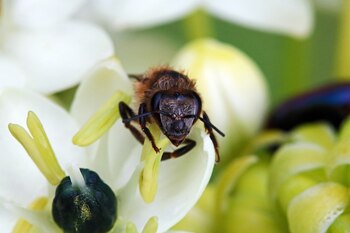
In the village of La Esperanza in the municipality of Turbo, Antioquia, there was a swarm of Africanized bees that attacked a 72-year-old blind man who later lost his life. Apparently, the honeycomb was located on one of the power poles near the victim's house.
Not only was this man affected, 10 other people were injured, one of them is a pregnant woman and a man recovering from surgery.
According to neighbors in the sector, these animals have built their diapers on several of the power poles and on several occasions have called on the corresponding authorities to solve this problem that puts their lives at risk.
At the call of the community, the Turbo Risk Management Office indicated that it has begun work to rescue the bees and move them to an area where they do not pose any risk to the inhabitants of the area.
“They are progressing in the work to recover the largest number of bees so that they can be located in areas remote from the population with the intention of avoiding a similar situation,” said Juan Carlos Bello, head of Turbo's Risk Management office.
The Department of Disaster Risk Management in Medellin recommends in the event of a bee attack:
Another attack by these insects was also reported in four neighborhoods in the municipality of Tubará, Atlántico. According to the municipality's fire department reported that within the attack of the bees 25 birds and three dogs died, apparently as a result of multiple insect bites.
In addition, five people who also received bites, but are being treated in health centers, among those affected there is an older adult.
“The situation could have been worse. We were able to control the bees by asking for support from the voluntary fire brigade of the municipalities of Galapa and Juan de Acosta since we don't have the equipment as we don't yet have an agreement with the mayor's office,” explained José Luis Jiménez, current commander of the municipality's Fire Department.
It is noteworthy that this type of insect has a defensive behavior, describing itself as very aggressive in the face of discomfort. They attack in numbers, very quickly and follow their victim up to four hundred meters from their hive or swarm.
Jennifer Fewell, professor at Arizona State University, said to the BBC that “unlike honey bees, this subspecies is extremely sensitive to the presence of humans, so it is not necessary to disturb them for them to activate their natural alarm system.”
Keep reading:
Últimas Noticias
Debanhi Escobar: they secured the motel where she was found lifeless in a cistern
Members of the Specialized Prosecutor's Office in Nuevo León secured the Nueva Castilla Motel as part of the investigations into the case

The oldest person in the world died at the age of 119
Kane Tanaka lived in Japan. She was born six months earlier than George Orwell, the same year that the Wright brothers first flew, and Marie Curie became the first woman to win a Nobel Prize

Macabre find in CDMX: they left a body bagged and tied in a taxi
The body was left in the back seats of the car. It was covered with black bags and tied with industrial tape
The eagles of America will face Manchester City in a duel of legends. Here are the details
The top Mexican football champion will play a match with Pep Guardiola's squad in the Lone Star Cup

Why is it good to bring dogs out to know the world when they are puppies
A so-called protection against the spread of diseases threatens the integral development of dogs




